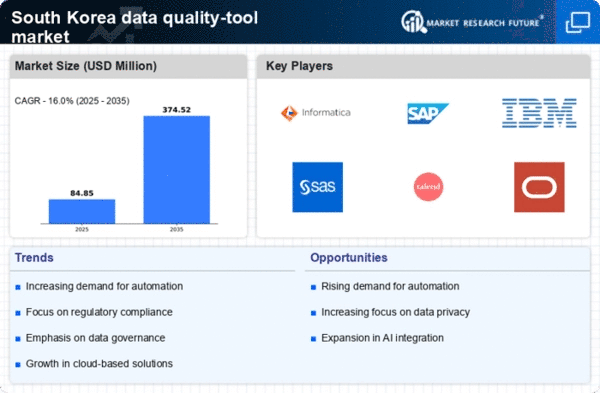Escalating Data Volume and Complexity
The data quality-tool market is being propelled by the escalating volume and complexity of data generated by organizations in South Korea. With the proliferation of digital technologies, businesses are inundated with vast amounts of data from various sources, including social media, IoT devices, and transactional systems. This surge in data volume presents challenges in maintaining data quality, as inaccuracies can lead to poor decision-making and operational inefficiencies. As a result, organizations are increasingly investing in data quality tools to manage and cleanse their data effectively. It is estimated that the market could grow by 15% annually as companies seek solutions to address these challenges and ensure that their data remains reliable and actionable.
Rising Adoption of Cloud-Based Solutions
The data quality-tool market is witnessing a significant transformation with the rising adoption of cloud-based solutions in South Korea. Organizations are increasingly migrating their data management processes to the cloud, which necessitates the use of effective data quality tools to ensure data integrity and accuracy. Cloud-based data quality tools offer scalability, flexibility, and cost-effectiveness, making them attractive to businesses of all sizes. As per industry reports, the cloud segment is anticipated to account for over 40% of the total market share by 2025. This shift towards cloud solutions is likely to drive innovation in the data quality-tool market, as vendors develop advanced features to cater to the evolving needs of cloud users.
Enhanced Focus on Customer Data Management
In the current landscape, there is an enhanced focus on customer data management within the data quality-tool market. South Korean businesses are recognizing the importance of maintaining high-quality customer data to improve customer engagement and retention. As organizations strive to deliver personalized experiences, the accuracy of customer data becomes paramount. This trend is driving the demand for data quality tools that can help businesses clean, validate, and enrich their customer data. Market analysts suggest that investments in customer data quality solutions could increase by 20% over the next few years, reflecting the growing recognition of the strategic value of high-quality customer information in driving business success.
Increasing Regulatory Compliance Requirements
The data quality-tool market is experiencing a notable surge. This surge is due to the increasing regulatory compliance requirements in South Korea. Organizations are compelled to adhere to stringent data protection laws, such as the Personal Information Protection Act (PIPA). This legislation mandates that businesses maintain high standards of data accuracy and integrity. Consequently, companies are investing in data quality tools to ensure compliance, thereby mitigating the risk of hefty fines and reputational damage. The market is projected to grow at a CAGR of approximately 12% over the next five years, driven by the need for robust data governance frameworks. As organizations strive to meet these regulatory demands, the data quality-tool market is likely to expand significantly, reflecting the critical role these tools play in maintaining compliance and enhancing data management practices.
Growing Emphasis on Data-Driven Decision Making
In South Korea, there is a growing emphasis on data-driven decision making across various sectors, which is significantly impacting the data quality-tool market. Businesses are increasingly recognizing the value of accurate and reliable data in driving strategic initiatives and operational efficiencies. As organizations seek to leverage data analytics for competitive advantage, the demand for data quality tools is expected to rise. According to recent estimates, the market could reach a valuation of $300 million by 2026, as companies prioritize investments in technologies that enhance data quality. This trend indicates a shift towards a more analytical approach in business operations, where data quality tools are essential for ensuring that decision-making processes are based on trustworthy information.
















